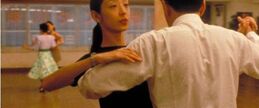The male protagonist in the film is very like most people who are pushed away by life. He talks about his past family, his past job, his past appearance, and his past behavior. It seems that everything in life talks about the past. , and it seems that there is something blocking in life that just can't pass. I don't know why I'm alive, and I don't know how tomorrow is different from today or yesterday. The wife of the male protagonist is also very much like most wives. As long as the husband is happy and the children are happy, he feels that life is very happy. He is kind and gentle, but he does not know how to live truly.
At this time, the male protagonist saw a dance teacher who was as lonely as him. Her eyes seemed to be missing something like her own. They were all looking for a more real life. Dancing has become their common passion. Once people have an obsession, their daily life will add an extra light.
At first, the ambassador thought it was a family ethics drama related to marital infidelity. With the development of the plot, I gradually understood the two pairs of eyes that were unconsciously searching for each other. I want to dance with you, not because you are beautiful and noble, but because you let me know how real I am who is passionate about one thing; I want to dance with you, not because you approach me when I am lonely, but because you let me I found myself who took dancing as my whole self. So, let's talk about love and dance. They were not talking about extramarital affairs, nor were they dancing ballroom dancing.
Everyone in the film has a story, no matter how humble they are, they all find their greatest enthusiasm in front of dancing. Each character finally reconciles with life in dance and finds the passion to continue. The high suicide rate has always been a serious problem plaguing Japanese society. Some experts pointed out that the introverted and restrained character of the Japanese is one of the reasons for the high suicide rate. When faced with problems in life and work, most Japanese choose to remain silent. If the stagnation in the heart is not sorted out and resolved for a long time, it may eventually lead to the idea of suicide. At the beginning, most of the characters in this film showed characters who were not good at communication and resolution. Whether they were husband and wife, teachers and students, father and daughter, or colleagues, they did not understand each other and even disrespected each other. The melody of the dance and the concentration when dancing lead them to forget their identity and distress, as the male protagonist said: those of you who haven't danced, don't criticize those who are obsessed with dance. This movie was ranked first among the top ten Japanese movies in 2007. I believe that many people who have watched this movie have found their frustration and finally learned to reconcile with themselves.
Come on, please feel life, please dance with me!
View more about Shall We Dance? reviews











